You have purchased or inherited a beautiful antique mirror but the silvering is defective. Black-edge, black spots, flaking, or scratches have damaged the original silvering, and you wonder – should I re-silver my antique mirror?
Re-silvering is offered by only a few companies in the USA. Unless you can deliver and pick up your mirror, shipping charges make the process expensive. Re-silvering is only worthwhile if you have an etched, historic, or specially shaped antique mirror. A degree of damage may even be aesthetically desirable – read on to learn the pros and cons of re-silvering.
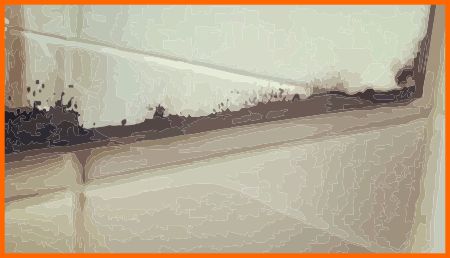
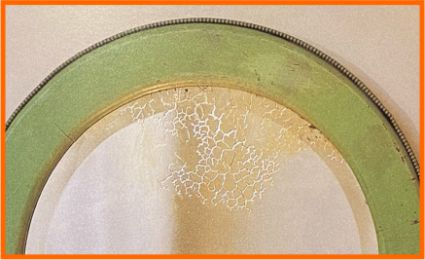
The first mirrors used by humans were probably pools of dark, still water, or water collected in a primitive vessel. By the Stone Age, mirrors were made from polished rocks like black volcanic glass (obsidian). In the Bronze and Middle Ages burnished disks of copper, bronze, or silver were widely used. These days, mirror is made by depositing a thin layer of metallic silver onto glass by the reduction of silver nitrate. The silver is then protected by a layer of paint.
The mirrored surface is very vulnerable to damage by scratching, deterioration due to moisture, or simply age-related flaking so it is rare to find an antique (over 100 years old) mirror in pristine condition. The question becomes: when is it a good idea to re-silver an antique mirror?
As an Amazon Associate I earn from qualifying purchases.
How is Mirror Re-Silvering Done?
Re-silvering is a difficult process, requiring expensive and toxic chemicals, very great attention to detail, and fastidious cleaning of the glass. The first step is to remove the protective paint using a paint stripper. Then the silvering is dissolved using nitric acid or a special silver stripper. Finally, a complex process of surface preparation and application of silver nitrate is required to form the new silvering under conditions of perfect cleanliness. This silvered surface then has to be protected by a layer of paint. The bottom line is that re-silvering is very difficult and is best left to professionals.
Why Should you Re-Silver a Mirror?
Many pre-1950s mirrors were made with slightly thicker glass (5/16″ rather than 1/4″) than is currently used. These old mirrors are therefore significantly heavier than their modern equivalents but, apart from this, there is nothing special or distinctive about most antique mirrors.
So, there is no reason to re-silver a damaged old mirror unless it has a special shape or has engraving on the reverse side. In fact, it is quite likely that an old mirror will have scratches on the front (glass) surface that will be accentuated by re-silvering. For plain, undecorated mirrors it is almost always better to purchase a new replacement.
Re-silvering to Restore an Engraved Mirror
The style of decorative mirror, shown below, is typically found in Mid-Century American homes on the doors of medicine cabinets or over the bathroom vanity. The dated and primitive floral design is engraved deeply into the glass using traditional stone- and copper-wheel techniques. The engraved areas are polished with pumice on felt wheels then the entire reverse of the glass is silvered.
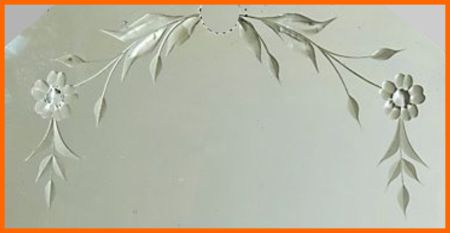
If the silvering fails on a mirror such as this, and, if you want to preserve the engraving, then it may be worthwhile sending it to a re-silvering shop. See this section for the locations of silvering shops and estimates of prices.
Re-silvering to Repair a Broken Venetian Mirror
Another category of restoration where silvering may be appropriate is the repair of elaborate antique or modern Venetian-style mirrors. These highly ornate and baroque-style mirrors have been manufactured in Venice for centuries and are now copied in countries like China and India.
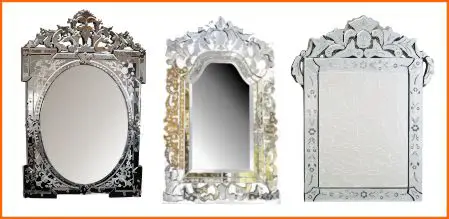
The components of the mirror are cut and beveled by hand, engraved on the reverse side, silvered, and then attached, by decorative screws and/or adhesive to a wooden substrate. The decorative borders and crests are especially delicate.
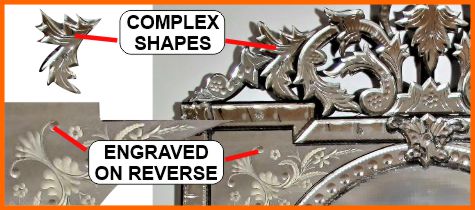
These complicated mirrors are highly vulnerable to damage, especially during moving – so take great care to wrap them yourself instead of trusting them to the moving company. If a piece of a Venetian mirror gets broken you will need a specialist repair company like Artistry in Glass in Tucson because the missing piece will have to be cut, beveled, and engraved by hand before it is silvered.
If your damaged mirror is not an antique and not of sentimental value, consider purchasing a new one instead of going to the trouble and expense of a repair.
Venetian Mirrors are handmade by skilled craftsmen and were considered the masterpieces of art. Available here on Amazon, this mirror is about 30 ” wide and 48″ tall. Venetian mirrors are extremely elaborate, with beautiful layers and gorgeous etching. Made to extremely high quality in India.
Beautifully engraved and beveled Venetian-style mirror about 12″ wide * 24 1/2″ tall. Made in Indian to reproduce the style of original Venetian mirrors.
This would be a less expensive choice than going to the trouble of repairing a damaged mirror.
Where Can I Get My Mirror Re-Silvered?
Mirror re-silvering is complicated and expensive and the use of toxic chemicals has made the process even more demanding in the era of stricter OSHA compliance requirements. For this reason, there are only a few US glass companies that advertise the service. Remember that a large part of the cost will be the crating, packing, and shipping of your mirror to and from the silvering shop – so you save money if you are close to one of the locations shown below. (Shipping costs are much less with small (hand) mirrors).

Artistry in Glass cannot endorse specific companies but those listed below are the ones that responded to our requests for quotes on re-silvering a 24″ * 36″ mirror – so we believe that the following glass shops are in business as of June 2021:
- Coast Mirror Company, Milwaukie OR
- Walter’s Mirror, Ridgewood NY
- Bear Glass, Brooklyn NY
- Alchemy Mirror Resilvering, St Paul MN
- Madison Glass Co, Nashville TN
- Historic Interiors, Randolph IA (stopped work because of high silver prices)
- Artmill Group, Chicago IL
- Antiqued Mirror Company, Burbank CA
- Robinson Glass & Mirror Company, Houston TX
What is the Cost of Mirror Re-silvering?
The companies above have quoted prices of between $40.00 to $80.00 per square foot for silvering with minimum charges (for small mirrors) of $45.00. For large mirrors (over 6 square feet or so), the additional cost of packing and shipping is a major portion of the final price. So a relatively small mirror about 24 inches by 36 inches can easily cost $1000.00 depending on the shipping. Contact the individual glass shops to get firm prices. Contrast this with the much lower cost ($55.00 to $75.00) of a new 2-foot by 3-foot mirror.
Can I Re-Silver My Own Mirror?
Real silver nitrate re-silvering is tricky as explained below. However, if you have a small decorative mirror and enjoy “do-it-yourself” activities you can use silver spray paint to produce a reasonable quality of silvering. See this post for a complete test of available silver spray paints.
Kits are available (see details below) for removing the old silver and then re-silvering but our experience is that they are only suitable for small mirrors. Large (more than 2 square feet) should be left to professionals. Also, unfortunately, it is not possible to carry out partial re-silvering – attempting to fix a small damaged area – because the boundary between the old and new silvering will always be a conspicuous line.
Mirror Back Removal Kit
Contains everything needed to remove the backing paint and silver from a mirror. This kit is used to prepare an old mirror for re-silvering.
“Worked great. Easy to use. Clear instructions. Quality products. I was able to remove, then re-silver, a 70-year-old jewelry box mirror that has passed from my grandmother to my daughter.”
Angel Gilding Mini Silver Kit
Contains the chemicals needed and measuring instruments to make your own silver mirror. For more information including comprehensive instructions and videos visit Angel Gilding. This product may not work when the process is not followed as detailed in the instructions.
How to Disguise Damaged Mirrors Without Re-Silvering
Several testimonials and personal experience have taught us true re-silvering is a difficult process and success is not guaranteed so consider the following alternative methods to solve the problem of defective silvering:
- Replace with a new modern mirror
- Replace with a new mirror with a design to match the old one
- Decorate the mirror to disguise the damage
- Add a mirrored border or extra frame
Replace with a New Modern Mirror
Unless your antique mirror has special artwork or engraving, it is almost always best to buy a new, replacement mirror. These days, high-quality glass mirrors are available in 1/8″, 3/16″, and 1/4″ thicknesses. Each mirror thickness looks the same from the front so the choice depends mainly on the size of the mirror and the strength requirements. If the frame is solid and not warped, we highly recommend downsizing the thickness to 3/16″ because this will significantly reduce the weight of large mirrors making them easier and safer to hang.

Save weight by choosing a lighter 3/16″ or 1/8″ thick mirror to replace the heavy old 1/4″ or 5/16″ thick antique glass. For small- to medium-sized mirrors (up to 8 sq. ft. or so) ask your glass shop for 1/8″ clear mirror with vinyl backing for added safety.
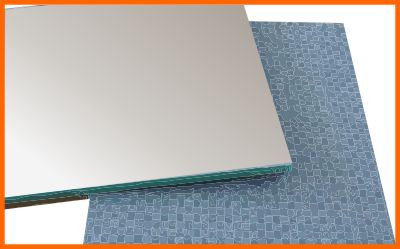
1/8″ Clear Mirror with Vinyl Backing
This economical mirror type is very lightweight (suitable for attaching to closet doors) and comes with a woven vinyl backing as a safety feature to hold the mirror shards together in case of breakage. Ideal for replacing small damaged mirrors
Can I Install My Own Replacement Mirror?
Simple Mirrors – Squares or Rectangles
If your mirror is a simple rectangle, most reasonably handy homeowners can replace it themselves. The steps are:
1) Remove the hanging wire, the backing paper, and the small brads holding in the old mirror.
2) Carefully take out the antique mirror and measure it to the nearest 1/16″.
3) Decide on the thickness and type of mirror. A beveled edge adds considerable class to a framed mirror but will increase the cost. If you decide on a luxurious bevel, you will need to order a 3/16″ or 1/4″ thick mirror. Otherwise, consider saving weight by ordering 1/8″ vinyl-backed mirror.
3) Order a new mirror from your local glass & mirror shop. Make sure the replacement is not bigger than the old one (it is safer to subtract 1/16″ to be certain it will fit). Frugal and economical customers can often get the best prices by learning “Glass-Speak” – the insider jargon of the glass business.
4) Repeat step 1 in reverse to place your mirror back in the frame. For a professional look and extra protection, cover the back of the mirror with thick brown paper glued to the frame with Elmer’s or similar wood glue.
Replace with a Modern Mirror Engraved to Match the Original
If you cannot afford the $1000.00 or so price tag to re-silver your antique mirror, and would rather not risk damage in shipping, an excellent reproduction can be made by companies like Artistry in Glass who are skilled in sandblasting. The method is to copy the original engraved pattern, make a vinyl stencil or resist and apply this to the reverse (silver-side) of the new mirror. By skillful sand carving (deep sandblasting through the silvering) the engraving can be closely duplicated. After the mirror is thoroughly cleaned, the newly carved design is sprayed with glossy silver paint. The finish is not quite as perfectly glassy as true silvering but the effect is very pleasing and the cost (about $250.00) for a brand new mirror is affordable.
Decorate the Mirror to Disguise the Damage
If the damage to the silvering is localized it is sometimes possible to sandblast a design to cover and disguise the defect. Use your creativity or consult the experts at Artistry in Glass in Tucson.
Add a Decorative Border or New Frame
If you have a mirror, glued to the wall, that has damaged silvering, your alternatives are to remove the mirror from the wall or disguise the damage in some way. Taking down wall mirrors is a difficult job if they have been attached with mastic, so disguising the damage with a decorative frame is a cost-effective option – if the damage is located around the border.
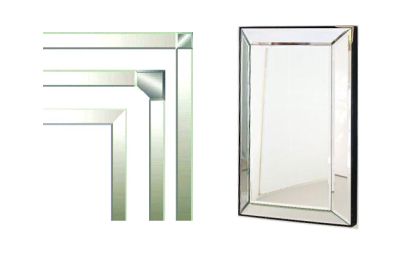
Beveled Mirror Strips
Ask your glass company to cut these beautiful beveled mirror strips and corners (available on Amazon) to make a sparkling border for your mirror.
Attach the strips with double-sided tape and dress up your mirror without removing it from the wall.
60″ long Acrylic Mirror Strips
Millennium International Development Corporation 15260 Acrylic Mirror Strips 60″. Easily cut these sparkling strips to form a decorative frame to your mirror – AND hide damaged silvering. Attach the strips with double-sided tape.
Unique Mirror Resources from Artistry in Glass
Mirror Installation & Removal
- How to hang a wall mirror
- How to frame a builder’s grade bathroom mirror
- How to hang a frameless mirror with glue
- Best clips for hanging mirrors
- How to attach a mirror to a closet door
- How to remove a mirror glued to the wall
Mirror Repair & Restoration
- Should I resilver my antique mirror?
- Can I repair scratched mirror silvering?
- What is the best spray paint for mirror silvering?
- How to fix a cracked mirror
- How to repair a broken mirror frame
Artistry in Glass: your source for antique repair in Tucson
Check out these informative articles:-
- Where can I get antiques repaired?
- Are broken antiques worth fixing?
- How to fix a broken picture frame
- How to repair a broken china plate
- How to repair a broken china teapot
- How to fix a broken marble slab
- How to repair a broken china coffee mug
- How to repair a 2000-year-old sculpture
- All about repairing stained-glass lampshades
- How to care for your stained glass skylight
- How to repair Dalle de Verre
- Is stained glass worth repairing?
- To repair or toss out?
- What to do with broken antiques
- Is lead crystal dangerous?
- Repairing an antique Mexican statue
- Repairing religious statues
- The history of Swarovski crystal figurines
- How to find the value of a Swarovski Crystal figurine
- Have Swarovski figurines lost value since 2009?
- How to collect Swarovski annual ornaments
- How to display Swarovski crystal figurines
- How to authenticate a Swarovski crystal figurine
- How to display Swarovski annual ornaments
- How to clean Swarovski crystal figurines
- How to repair a Swarovski crystal mouse
- How to repair a Swarovski annual ornament
- How to repair a Swarovski crystal train set
- Fixing broken wine glass stems
- How to clean cloudy glasses
- Why do wine glasses have stems?
- Swarovski Crystal Figurines
- How to repair a chip in a wine glass
- How to fix a scratched glass tabletop
- How to replace a broken patio tabletop





